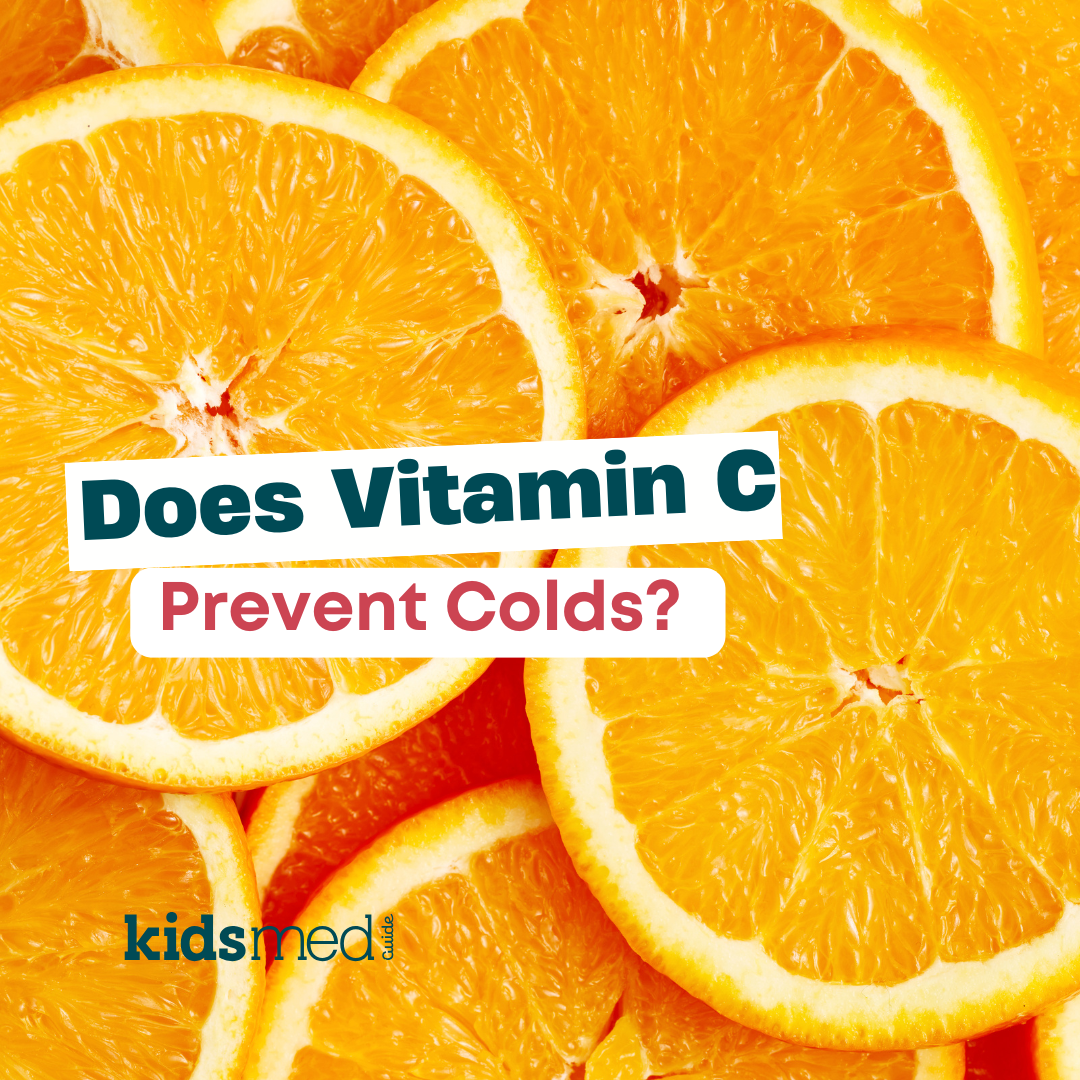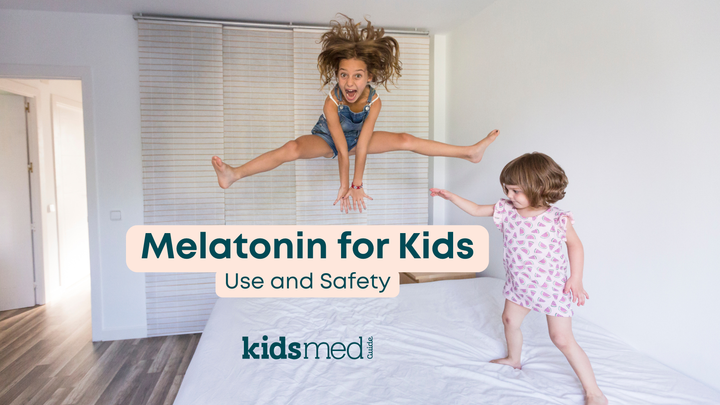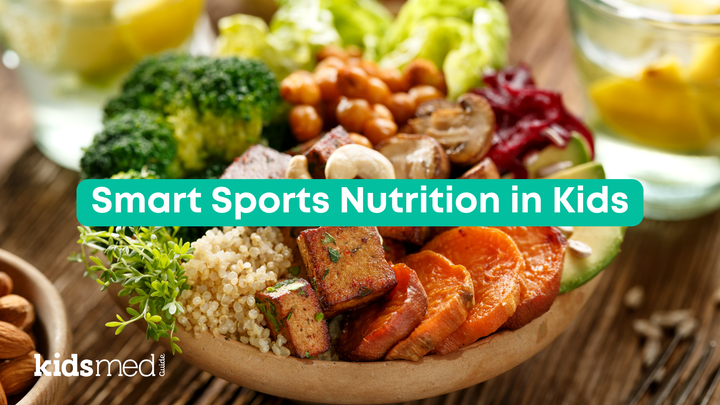Vitamin C for Kids: Can It Prevent Colds?

Cold and flu season is long—so long. And where kids are concerned, for the common cold, there really isn't a "season." You can get a cold year-round, and kids always seem to catch them! It's March, and we're exiting winter illness season only to welcome spring illness season—with seasonal allergies tossed in.
My family has had some doozy cold seasons over the last few years. I've found myself researching "preventing colds in children" at 3 a.m., hoping for ANY new information. Parents, myself included, are ready to get off the circus ride of snot and get back to life as scheduled.
One of the most commonly asked questions regarding cold prevention is: Does vitamin C actually work, and how much should I give?
Does Vitamin C Prevent Colds in Children?
The common cold is one of the most frequent illnesses in children, leading many parents to look for ways to prevent it. While generally not harmful, colds lead to missed sleep, missed days of school and daycare, and missed work for parents.
Vitamin C and immunity have long been linked. Growing up, your mom probably told you to drink all your orange juice to get vitamin C. Or maybe you ate those little Flintstones® vitamins. But what does the research say?
In 2013, an academic group conducted a comprehensive review of the published placebo-controlled studies on vitamin C and its effects on the common cold. They analyzed results from over 11,000 people between dozens of quality trials.
The results showed that routine vitamin C supplementation does not significantly reduce the number of colds in children. However, daily vitamin C supplementation of 200 mg or more likely helps to slightly lessen the duration and severity of cold symptoms.
The study authors reached that conclusion based on all of the available data. However, these conclusions haven't been replicated in a large, high-quality, randomized controlled trial, and more research is needed.
It's worth noting that the potential benefit of shorter and less severe colds was only noted with daily supplementation, meaning the supplements were taken when patients were feeling well and before the onset of any cold symptoms. Supplementing with vitamin C after the onset of symptoms was not beneficial.
Wondering how to lessen cold symptoms and prevent the spread of germs after a cold has settled in? The answer may lie in concentrated saline nasal spray!
Vitamin C supplements in adult athletes
Interestingly, vitamin C supplementation has been shown to prevent or lessen illness in adult ultra-athletes, particularly those who may endure extreme conditions like cold weather, such as marathoners and military personnel. There seems to be some link between vitamin C and colds, at least for adult athletes, but more research is needed!
Vitamin C Supplements for Kids
The consensus among healthcare providers is that routine vitamin C supplements should not be given to children to prevent colds. It just hasn't been proven to work. Any benefit in the duration or severity of cold symptoms is minimal. While vitamin C supplements are generally safe and have few side effects, a daily supplement is not worth the risk, expense, or effort.
Supplements, vitamins, minerals—basically, most of the products you can find on the drug store shelf available for purchase—are not regulated the same way as prescription medicine. For my children, I do my best to avoid supplements and homeopathic remedies because, in general, the companies that produce them don't have to subject themselves to inspection or quality control.
With a dubious benefit, there's no reason to introduce a daily supplement and assume the cost, hassle, and risk of unregulated products. I can't even remember to take my own daily medication; I don't need to add more to the family mix!
If you try a vitamin C supplement, look for one from a reputable manufacturer. When I purchase over-the-counter products for my family, I try to find a company with the Good Manufacturing Practices (GMP) seal.
Vitamin C supplement safety
Excess vitamin C is eliminated from the body via the kidneys. If your child has kidney problems or a history of kidney stones, definitely talk to your pediatrician before considering a supplement. Kids with diabetes or G6PD deficiency should also take vitamin C with caution and in consultation with their doctor.
If your child has certain chronic health conditions, is a very picky eater, or if you have questions about their immune system, it's reasonable to think about vitamin C supplementation. Talk to your pediatrician. They can help determine whether a vitamin C supplement or other remedy is warranted.
Natural Sources of Vitamin C
While we've established that routinely supplementing with vitamin C is not recommended, it is well known that vitamin C is an essential nutrient. Kids need it for immune system function and other health benefits. A diet rich in fruits and vegetables and vitamin C has been linked to reducing the incidence of cancer and cardiovascular disease.
Thankfully, most kids get plenty of vitamin C! Rather than relying on supplements, a balanced diet rich in whole foods is the best way to ensure your child gets enough vitamin C and other essential nutrients. Some of the top vitamin C-rich foods for kids include:
- Citrus fruits: Oranges, grapefruits, lemons, and limes
- Berries: Strawberries, raspberries, and blueberries
- Melons: Cantaloupe and watermelon
- Vegetables: Bell peppers, broccoli, Brussels sprouts, potatoes, tomatoes, and spinach
Adding these foods to your child’s meals can naturally boost their vitamin C intake and support overall health. Vitamin C is also added to other foods kids like, such as cereal.
How Much Vitamin C Do Kids Need?
Recommended daily allowance (RDA) is a term used by healthcare providers and dieticians and may also appear on food and supplement labels. It is an estimated measurement of the daily amount of a nutrient required for most people to stay healthy.
The RDA for vitamin C varies by age:
- 1-3 years old: 15 mg per day
- 4-8 years old: 25 mg per day
- 9-13 years old: 45 mg per day
- 14-18 years old: 65-75 mg per day
- Adults: 75-90 mg per day
The good news is that most children can meet these requirements through diet alone! Vitamin C is found in many fruits and vegetables and is added to many foods. If your child is healthy and eats a reasonable diet, they probably get enough vitamin C.
If you're curious or want to ensure your child gets enough vitamin C, you can easily estimate it by looking at the nutritional labels of foods your child eats or drinks. If vitamin C is not listed on the label, look up the average amount in a typical serving size (say, of a strawberry or tomato).
Nutrition for kids is best measured over a week or longer. Kids naturally have some days when they eat well and others when they refuse everything except spaghetti or a hot dog. You can look at the RDA of vitamin C, but you should average that out over a week or month rather than stress about a single day's amount.
When do Kids Need Vitamin C Supplements?
If your child eats various fruits and vegetables, they’re likely getting enough vitamin C naturally. However, some situations where a supplement may be beneficial include:
- Frequent colds and infections
- Limited diet or picky eating habits
- Food allergies or dietary restrictions
- Increased intense physical activity (e.g., sports training)
Please always consult your pediatrician before giving your child a supplement to ensure they get the correct dosage and that it is genuinely needed. Ask your doctor about a multivitamin containing vitamin C. If you suspect your child may be low in vitamin C, they're likely low for other vitamins or minerals.
Other Ways to Boost Your Child’s Immune System
While vitamin C plays a role in immune support, it’s not the only thing that helps to keep your child healthy. Vitamin C supplementation hasn't been proven to reduce colds, but getting enough vitamin C as part of a balanced diet will help your child stay healthy.
Here are some other tips to help prevent colds and keep your child's immune system in tip-top shape:
- Encourage Proper Handwashing – Regular handwashing with soap and water reduces the spread of germs.
- Ensure a Balanced Diet – Nutrient-dense foods support immune function.
- Prioritize Sleep – Kids need at least 9-12 hours of sleep per night, depending on their age.
- Keep Up with Vaccinations – Vaccines are crucial for preventing serious infections.
- Promote Physical Activity – Exercise supports overall health and immunity.
Final Thoughts
While vitamin C cannot prevent colds, it may help slightly reduce the severity and duration of symptoms. There is a link between vitamin C and immunity, but no evidence supports taking a daily supplement, especially for kids.
The best approach is to ensure your child gets enough vitamin C through a healthy diet. A pediatrician-approved vitamin C supplement can help fill any nutritional gaps if needed, but we suggest you talk to your doctor before introducing a regular supplement.
Interested in the latest updates on treating colds in kids? Check out our blog on concentrated saline nasal spray, the hottest thing since sliced bread. Also, be sure you're stocked up on sick day essentials. You never know when those boogers will hit.
Stay well!
The following references were used to compile this information:
DailyMed—VITAMIN C- ascorbic acid tablet. (n.d.). Retrieved March 12, 2025, from https://dailymed.nlm.nih.gov/dailymed/drugInfo.cfm?setid=d74dd994-2520-4d17-8d9d-fa06e9e8de96
Hemilä, H., & Chalker, E. (2013). Vitamin C for preventing and treating the common cold. The Cochrane Database of Systematic Reviews, 2013(1), CD000980. https://doi.org/10.1002/14651858.CD000980.pub4
Office of Dietary Supplements—Vitamin C. (n.d.). Retrieved March 12, 2025, from https://ods.od.nih.gov/factsheets/VitaminC-HealthProfessional/



